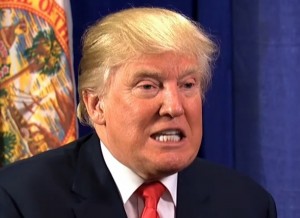
SEOUL—Donald Trump, the front-running U.S. presidential candidate for the Republican Party, is not winning a lot of friends among America’s key allies in Asia after criticizing their contributions to regional security and suggesting they develop their own nuclear arsenals.
In an interview with The New York Times, the Republican front-runner called for a complete reassessment of longstanding U.S. security pacts with Japan and South Korea.
Trump has in the past criticized both Asian allies as “free-riders” for paying Washington too little for contributing 50,000 American troops in Japan and 28,500 in South Korea to maintain peace and security.
Saying the U.S. “cannot afford to be losing vast amounts of billions of dollars” to support peace and security in the region, Trump told the newspaper he would also consider withdrawing troops if Tokyo and Seoul did not agree to increase security reimbursements to Washington.
Trump said he would be open to allowing Japan and South Korea to build nuclear weapons to defend themselves against potential nuclear threats from North Korea and China, adding, “if the United States keeps on its path, its current path of weakness, they’re going to want to have that anyway.”[xyz-ihs snippet=”adsense-body-ad”]
Trump’s position has drawn harsh rebukes from officials and analysts who say such radical changes would greatly undermine U.S. credibility and alliances in the region, would likely lead to a nuclear arms race in Asia and would undercut international efforts to pressure North Korea to give up its nuclear weapons.
“It would be extremely damaging and plays right into the hands of the hardliners in Pyongyang,” said Daniel Pinkston, a lecturer in international relations with Troy University in Seoul.
Negative reactions
Japanese Chief Cabinet Secretary Yoshihide Suga on Monday rejected any suggestion that Japan might develop its own nuclear arsenal, saying, “The three non-nuclear principles of not producing, possessing or allowing nuclear weapons on Japanese territory are an important basic policy of the government.”
Prime Minister Shinzo Abe’s government, however, has been working to expand the country’s defense posture, and Trump’s comments about withdrawing from Asia could reinforce the need for a stronger Japanese military.
South Korean Defense Ministry spokesman Moon Sang-kyun said Monday it would be inappropriate to comment on U.S. presidential candidates other than to say the Republic of Korea (ROK) supports the security arrangements that have been in place with Washington since the Korean War in the 1950s.
“That alliance between the Republic of Korea and the United States is firmly being maintained by the ROK-U.S. Mutual Defense Agreement. There is no change in this position and principle,” he said.
After North Korea conducted its fourth nuclear test in January, some lawmakers in Seoul called for the development of a South Korean nuclear deterrent as well.
The President Park Geun-hye government, however, has rejected the need for nuclear weapons, relying instead on the protection of the U.S. nuclear deterrent guaranteed under its security alliance with Washington.
US security interests
The Republican presidential candidate said he is not an isolationist, but wants to put the interests of “America first.”
Critics say the successful businessman and author of the book The Art of the Deal is not considering how U.S. economic and strategic interests have benefited from the American military presence in Asia.
Nor they say has he considered how a U.S. withdrawal and nuclear arms race would damage American interests, alliances and increase the potential for nuclear conflict.
“If you think ahead a couple of moves and you think of the consequences of such an action it really doesn’t make any sense,” Pinkston said.
Some South Korean newspapers have called Trump’s comments dangerous and shocking.
The South Korean English-language newspaper JoongAng Daily on Monday ran a strongly worded editorial criticizing Trump, calling his views “myopic” and “utterly short-sighted.”
Japan’s Yomiuri Shimbun daily quoted an unnamed source saying, “If he becomes the U.S. president, it would be a problem for the Japan-U.S. national security system.”
Youmi Kim in Seoul contributed to this report.
Source: VOA
